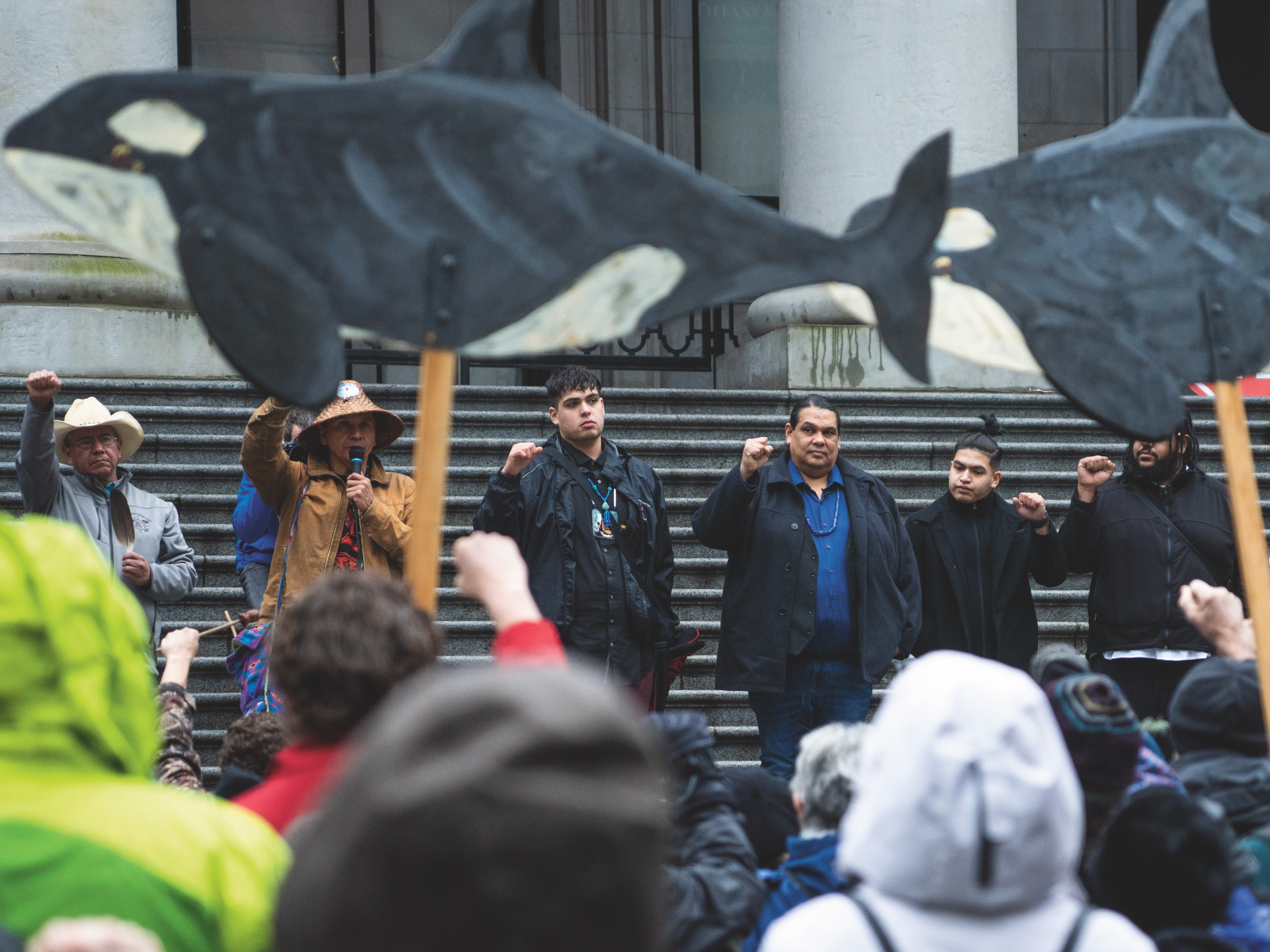Rueben George grew up on the sea. As a boy, he swam and boated in the Burrard Inlet, walked its shores at low tide and gathered Dungeness crabs, oysters, clams — the traditional foods of his people. George belongs to the Tsleil-Waututh Nation, a Coast Salish people who number about 550. Their reserve is located on Vancouver’s North Shore, but their traditional territory surrounds the Burrard Inlet, encompassing much of Vancouver.
The Tsleil-Waututh believe they have a sacred and legal duty to protect these lands and waters. But urban expansion and commercial and industrial development have polluted the waters of the inlet. The shellfish they once lived on are too contaminated to eat. “It’s pretty devastating,” says George. “My kids will never experience what I experienced.”
You may unsubscribe from any of our newsletters at any time.
George’s people numbered more than 10,000 before they were killed off by European diseases, residential schools and the other effects of colonialism. Today, the Tsleil-Waututh Nation is growing again, both in population and in wealth. They’ve reintroduced elk to wilderness areas, restored salmon stocks and clam beds, cleaned up parts of the inlet, and mapped locations of ancestral villages and traditional hunting and fishing grounds.
But a new struggle has come to the Tsleil-Waututh’s shores. Directly across the bay sits Kinder Morgan’s marine terminal, where tanker ships fill up with crude oil piped from Alberta’s tar sands. In 2011, Kinder Morgan sought an agreement from the Tsleil-Waututh allowing the company to expand its Trans Mountain pipeline and increase the number of tankers in the inlet. The Tsleil-Waututh didn’t respond, but held a referendum and voted to oppose the project.
More on Broadview: Inuk environmental advocate on the disappearing Arctic
According to 1,200 pages of environmental assessments commissioned by the Tsleil-Waututh, a single oil spill would have devastating and irreparable effects on their waters and the species that inhabit them. The pipeline expansion would “violate Tsleil-Waututh law,” they wrote. They vowed to fight until Kinder Morgan and the Canadian government, which supports the project, gives up.
As a boy, Rueben George learned the spiritual teachings that connect his people with the ecosystems around them. Naut-sa mawt is a Tsleil-Waututh phrase that translates as “one heart, one mind, one prayer.” George says, “It means we’re interconnected to everything that has a spirit.” That includes the water and the creatures that live in it. Tsleil-Waututh law is based on the principle of reciprocity. Every year, they paddle a fleet of ceremonial canoes past the Kinder Morgan marine terminal and sprinkle red earth on the water. “We do a prayer, and the prayer is simple,” says George. “Everything that we get out of the water is good. Everything going back into the water should be good.”
George is manager of the Tsleil-Waututh Nation Sacred Trust, an organization grounded in Tsleil-Waututh culture, spirituality and law with the mandate of stopping the Trans Mountain pipeline expansion. It’s allied in this fight with three other coastal First Nations, and together they are challenging the project in court. In 2018, the Canadian government purchased the embattled pipeline for $4.5 billion, and Prime Minister Justin Trudeau vowed to complete the expansion. “It’s sad to see that we’re driven by people that don’t believe that we carry a spirit within ourselves, that everything has a spirit,” says George. “We believe that everything has a spirit, everything has life, everything has rights.”
In the past four years, First Nations in Canada have won 250 legal challenges against resource-extraction projects, says George. “I haven’t seen anything like that in the history of nations standing up for lands and waters. People should be celebrating that.”
This story first appeared in Broadview‘s March 2020 issue.
Broadview is an award-winning progressive Christian magazine, featuring stories about spirituality, justice and ethical living. For more of our content, subscribe to the magazine today.















Who has authority in this situation- the elected band council or the hereditary Chiefs? It seems that there is an internal debate going between First nation leaders who support the pipeline and those who don’t. I wonder what non first Nation environmental groups would say if First Nations agreed to a compromise that would see the pipeline built? Would you applaud that the first Nations were now on sound economic footing with appropriate pipeline regulation in place?